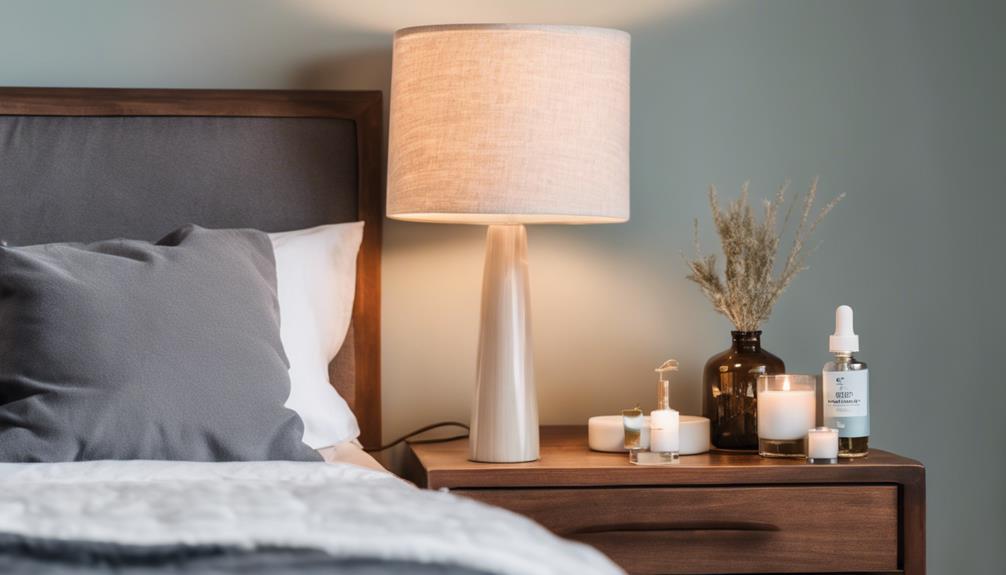Therapeutic Hypnosis Benefits
7 Best Ways Hypnotherapy Enhances Sleep Quality
September 11, 2022 - Therapeutic Hypnosis Benefits
Hypnotherapy enriches sleep quality through stress reduction techniques like mindfulness and guided imagery. It addresses insomnia patterns by restructuring negative thoughts and modifying behaviors. Improving sleep hygiene habits and promoting relaxation responses foster mental tranquility for better sleep. Resolving underlying trauma issues contributes to emotional healing and peacefulness. Regulating sleep-wake cycles and building positive sleep associations further enhance the quality of sleep. These methods work holistically to improve sleep quality by nurturing mental relaxation and addressing deeper issues.
Stress Reduction Techniques

Utilizing stress reduction techniques is essential in the practice of hypnotherapy to enhance sleep quality. Among these techniques, mindfulness meditation and guided imagery play pivotal roles.
Mindfulness meditation involves focusing the mind on the present moment, acknowledging and accepting thoughts and feelings without judgment. This practice helps individuals manage stress by promoting relaxation and reducing the activation of the body's stress response.
Guided imagery, on the other hand, utilizes visualization to create calming and peaceful mental images. By guiding clients through imaginary scenarios that evoke positive emotions and sensations, guided imagery can help alleviate anxiety and promote a sense of tranquility. This technique can be particularly effective in reducing racing thoughts and mental agitation that often hinder sleep initiation.
Incorporating mindfulness meditation and guided imagery into hypnotherapy sessions can equip individuals with valuable tools to cope with stress, unwind before bedtime, and ultimately improve their sleep quality. These techniques foster a state of mental relaxation conducive to falling asleep and experiencing restorative rest.
Addressing Insomnia Patterns
Addressing insomnia patterns involves identifying and addressing the underlying factors contributing to sleep disturbances. Cognitive restructuring and behavioral therapy are common approaches used to tackle insomnia. Cognitive restructuring aims to change negative thought patterns related to sleep, while behavioral therapy focuses on modifying behaviors that may be disrupting sleep.
Additionally, techniques like sleep restriction and stimulus control can be effective in improving sleep quality.
Sleep restriction involves limiting the time spent in bed to match the actual amount of sleep a person is getting, thus enhancing sleep efficiency.
Stimulus control helps associate the bed with sleep by encouraging individuals to go to bed only when sleepy and to get out of bed if unable to sleep after a short period.
Improving Sleep Hygiene Habits

Improving sleep hygiene habits involves establishing a consistent routine and environment conducive to quality sleep. A crucial aspect of enhancing sleep hygiene is optimizing the sleep environment. This includes keeping the bedroom dark, cool, and quiet to promote relaxation and minimize disruptions during the night. Additionally, ensuring a comfortable mattress and pillows can significantly impact sleep quality by providing adequate support.
Developing a bedtime routine is another key element in improving sleep hygiene habits. Engaging in calming activities such as reading a book, taking a warm bath, or practicing relaxation techniques before bed can signal to the body that it is time to wind down and prepare for sleep. Consistency in the bedtime routine helps regulate the body's internal clock, making it easier to fall asleep and wake up at the desired times.
Enhancing Relaxation Responses
Enhancing relaxation responses involves implementing techniques that promote a state of calmness and reduce stress levels to facilitate better sleep quality. Deep relaxation methods such as progressive muscle relaxation and guided imagery can help individuals unwind before bed, easing them into a restful state conducive to sleep.
These techniques focus on systematically tensing and then relaxing different muscle groups, promoting physical relaxation that can translate into mental tranquility.
In addition to deep relaxation, enhanced mindfulness plays a crucial role in improving sleep quality. Mindfulness practices, such as meditation and deep breathing exercises, can help individuals cultivate awareness of the present moment, letting go of racing thoughts and worries that often disrupt sleep.
By fostering a non-judgmental acceptance of one's thoughts and feelings, mindfulness techniques can create a mental space that is more conducive to falling asleep and staying asleep throughout the night.
When combined with deep relaxation methods, enhanced mindfulness can significantly enhance relaxation responses and contribute to a better overall sleep experience.
Resolving Underlying Trauma Issues

Therapeutic interventions aimed at uncovering and addressing underlying trauma issues play a pivotal role in promoting holistic well-being and potentially enhancing sleep quality. Trauma processing involves delving into past experiences that have caused emotional distress and working through them to achieve resolution.
Through techniques such as hypnotherapy, individuals can explore and process traumatic events in a safe and supportive environment, fostering emotional healing.
Addressing unresolved trauma can lead to a reduction in anxiety, fear, and other negative emotions that may disrupt sleep patterns. By engaging in trauma processing, individuals can work towards understanding the root causes of their emotional distress and develop healthier coping mechanisms. This emotional healing process not only benefits mental health but can also have a positive impact on sleep quality.
Ultimately, resolving underlying trauma issues through therapeutic interventions like hypnotherapy can contribute to a more peaceful mind, which is conducive to improved sleep patterns and overall well-being.
Regulating Sleep-Wake Cycles
Exploring the relationship between trauma processing and emotional healing can provide insights into how regulating sleep-wake cycles may be influenced by addressing underlying psychological distress.
The regulation of sleep-wake cycles is intricately tied to the body's circadian rhythm, which is essentially the internal clock that governs our sleep patterns and wakefulness. Disruptions in this rhythm can lead to sleep disorders such as insomnia, sleep apnea, or restless leg syndrome.
Addressing psychological distress through hypnotherapy can help individuals realign their circadian rhythm and improve their overall sleep quality. By resolving underlying trauma issues and promoting emotional healing, hypnotherapy can assist in restoring a more balanced sleep-wake cycle.
This, in turn, can alleviate symptoms of sleep disorders that may have been exacerbated by unresolved psychological issues.
Building Positive Sleep Associations

Establishing consistent bedtime routines can play a significant role in building positive sleep associations. By creating a structured bedtime routine, individuals can signal to their bodies that it is time to wind down and prepare for sleep. This can involve activities such as reading a book, taking a warm bath, or practicing relaxation techniques.
Consistency is key, as following the same routine each night can help train the brain to associate these activities with sleep, making it easier to fall asleep and stay asleep throughout the night.
Creating a conducive sleep environment is also crucial for building positive sleep associations. This includes ensuring that the bedroom is dark, quiet, and at a comfortable temperature. Investing in a comfortable mattress and pillows can further enhance the sleep environment, promoting quality rest.
Frequently Asked Questions
Can Hypnotherapy Help With Sleep Disorders Like Sleep Apnea?
Hypnotherapy has shown promising results in addressing sleep disorders like sleep apnea. Research suggests that hypnotherapy can help improve sleep quality and reduce symptoms of sleep apnea by targeting underlying psychological factors contributing to the condition.
Is Hypnotherapy Safe for Pregnant Women Struggling With Sleep?
Hypnotherapy benefits for pregnancy include addressing sleep struggles in expectant mothers. When administered by a qualified practitioner, hypnotherapy can be safe and effective in supporting pregnant women experiencing sleep difficulties, providing a non-invasive approach to improving rest.
How Many Hypnotherapy Sessions Are Typically Needed for Results?
The treatment duration required for hypnotherapy to yield significant results varies based on individual needs and complexities. Research suggests an average of 6-12 sessions may be needed for optimal success rates, although outcomes can differ.
Can Hypnotherapy Be Effective for Children With Sleep Issues?
Hypnotherapy can be effective for children with sleep issues by addressing underlying factors like children's anxiety and improving bedtime routines. Research suggests that tailored hypnotherapy sessions can help children achieve better sleep patterns and overall well-being.
Are the Effects of Hypnotherapy on Sleep Long-Lasting?
Research suggests that hypnotherapy can produce long-term benefits for sleep quality. Studies indicate that the effects of hypnotherapy on sleep can endure over time, leading to sustained improvements in sleep patterns and overall well-being.
Conclusion
In conclusion, hypnotherapy offers a range of effective techniques for enhancing sleep quality. By addressing underlying issues such as stress, insomnia patterns, and trauma, individuals can improve their sleep hygiene habits, relaxation responses, and overall sleep-wake cycles.
Through the use of positive sleep associations and various therapeutic interventions, hypnotherapy can play a valuable role in promoting better sleep patterns and overall well-being.
